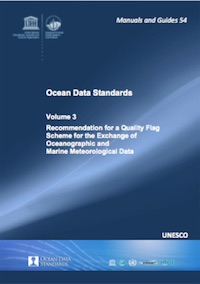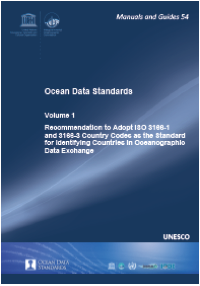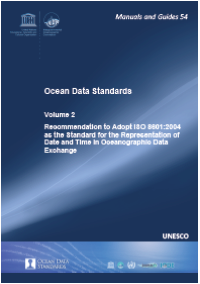|
The value of standards is clearly demonstrable; we need only look to the manufacturing sector to see their value. In oceanography, there have been many discussions and solutions for processing data and information. Many useful ideas, each a solution to an immediate problem, have been developed and put into practice, but there have been few successful attempts to develop and implement international standards in managing data.
In the past decades IODE has made a number of attempts to agree on data management standards (e.g. MEDI and mXML for marine metadata). However these attempts were not successful, possibly due to insufficient coordination with other similar initiatives.
Within the franework of the WMO-IOC Joint Technical Commission for Oceanography and Marine Meteorology (JCOMM), IODE has been cooperating with WMO on the agreement on standards (OceanDataStandards project). The scope of this project was expanded by IODE in 2013 when it established the "Ocean Data Standards and best Practices" project which would also disseminate and promote "best practices", in addition to "standards".
While the standards are published in the IOC Manuals and Guides series (see Recommended Standards ), the best practices (and standards) are made available through the new OceanPractices repository managed under the "IODE Clearing House Service for Data/Information Managemet practices project".
http://www.oceandatapractices.net
|
Recommended Standards

Recommendation for a Quality Flag Scheme for the Exchange of Oceanographic and Marine Meteorologocal Data (IOC Manuals and Guides NO. 54, Volume 3 - DOWNLOAD

Recommendation to Adopt ISO 3166-1 and 3166-3 Country Codes as the Standard for Identifying Countries in Oceanographic Data Exchange. (IOC Manuals and Guides No. 54, Volume 1) (English).Published on 6 January 2010 - DOWNLOAD 
Recommendation to Adopt ISO 8601 as the standard for the representation of dates and times in Oceanographic Data Exchange.(IOC Manuals and Guides No. 54, Volume 2) (English). Published on 2 February 2011 - DOWNLOAD
|
Reasons why now may be opportune to achieve success in developing international standards include:
- Internet and computer technologies allow for a more rapid exchange of data and information than possible in the past. Each individual partner in the exchange needs to understand the content and create software to transcribe what is delivered into the local data structures. This puts a serious burden on resources.
- Data volumes and sources are increasing rapidly. We must improve our handling of data and nformation.
- GEOSS is striving to develop a “system of systems” that links together many of the data and information sources around the world. This is a standards setting process without which GEOSS will not succeed.
- Major national and international data management projects in oceanography are underway in response to problems of managing the data in their multiplicity of structures and contents. International projects such as SeaDataNet must adopt standards to achieve the degree of cooperation foreseen.
- Participants at IODE-19 identified standards as one of the most critical elements to provide interoperability with IODE data centres and to share data.
- The recently adopted IOC Data and Information Strategy encourages the adoption of standards to support data usability and acknowledges that the success of the Strategy is dependent on the acceptance and implementation of standards
It is clear that the process of setting standards is underway. We can either play a passive role in this process, or guide it so that the experience we have gained over the years is reflected in those standards.
2012
The second IODE Workshop on Quality Control of Chemical and Biological Oceanographic Data Collections was held at the IOC Project Office for IODE, Oostende, Belgium, between 22-24 October 2012. The report is available HERE
2008
In partnership with the JCOMM Data Management Coordination Group IODE organized the IODE/JCOMM Forum on Oceanographic Data Management and Exchange Standards between 21-25 January 2008 at the IOC Project Office for IODE in Oostende, Belgium. (find out more HERE )
The meeting discussed a wide variety of topics including metadata, ontology resources, date and time, lat, lon, alt, countries, platforms, platform types, quality control (temperature and salinity profiles, surface temperature and salinity, sea level, currents, surface waves), quality flags, projects, institutions, units, instruments, science words, taxa and parameters.
The meeting further agreed on a "Standards Process" that will enable the recommendation of a standard to IOC and WMO. It was further agreed that a dedicated web site will be established to monitor progress of submissions and to disseminate adopted standards.
The we site is accessible through http://www.oceandatastandards.org
The Third Session of the JCOMM Data Management Coordination Group (Oostende, Belgium, 26-28 March 2008) (find the report here ) agreed with the Process as proposed by the Forum and establised the "Pilot Project on teh IODE/JCOMM Standards process". The Group further agreed that the PIlot Project will be managed by the IODE/JCOMM ETDMP and elected the Chairperson of the ETDMP (Dr. Nick Mikhailov) to lead the Pilot Project. It was further agreed that the membership of the Pilot Project should be balanced between the WMO and IOC communities and requested the ETDMP to create the membership in this way. The ETDMP will make the necessary arrangements for documenting and publishing the recommended standards as well as to cotninue their management, including updating.
The JCOMM/IODE ODS Pilot Project is managed by a JCOMM/IODE ETDMP Task Team for ODS. More information can be found here.
- Details
-
Created on: Monday, 19 May 2008 13:33
-
Last Updated on: Tuesday, 28 June 2016 10:12